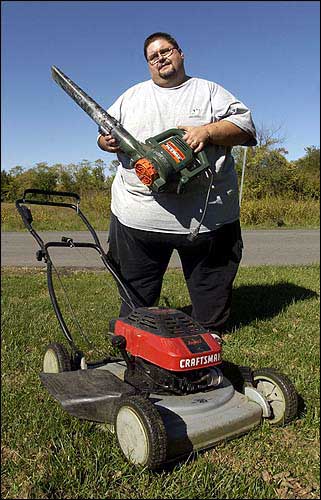Packrats, Good Samaritans recycle their clutter online
Kansas City, Mo. ? Bill Heeter admits he has a problem. He loves junk.
But the retired businessman is one of a growing number of packrats jumping online to give away their clutter or to take some off the hands of somebody else.
In less than two years, freecycling has caught on worldwide, with about a half-million givers and takers of everything from couches to cars and pingpong tables to pianos.
A few months ago, Heeter visited www.freecycle.org and joined the online community.
Heeter’s biggest problem was books. A thousand or more titles from an Internet textbook selling endeavor piled high in his suburban Kansas City garage.
He offered the books through the freecycling network for anyone to take, and nearly 3,000 freecyclers in and around Kansas City got an e-mail. The same day a woman replied and offered to take all the books to sell at a church garage sale.
“I thought, ‘Where has this been?’ I’ve been purging junk for years and never questioned if it’d be useful to someone else,” said Heeter, 41. “I can see myself freecycling forever. Our garage will never be like that again.”
With his garage cleared, Heeter had space for a lawnmower and a leaf blower. He got those free from fellow freecyclers.
Since discovering the “virtual curb” of sorts, Heeter and his wife have been cleaning out closets and offering more stuff to the free message group hosted by Yahoo.com. His son gave his unused Pokemon toys to a younger child through freecycling.

Bill Heeter displays the lawn equipment he received for free at his home in Grain Valley, Mo. Heeter got the equipment through a Kansas City freecycling group after giving away more than 1,000 books through the same group.
Cutting down on trash
Deron Beal started the grass-roots movement in May 2003 in Tucson, Ariz., to slow the growing landfills in his community. The idea has scattered through cyberspace and word of mouth to about 1,500 cities worldwide.
There are freecyclers in Australia and Alaska. Portland, Ore., has the largest freecycling group with about 10,000 members. About 300 people freecycle in Manhattan, Kan., with the same number in Jefferson City, Mo. Every participating city has a local volunteer to manage the group.
Shane Brady and his girlfriend, Kelly Garbato, started the Kansas City freecycling group last September. In one year membership has grown to 3,000 members. About 20 new people sign up every day in Kansas City alone, and the couple volunteer two hours or more moderating daily activity. They also participate. Brady picked up a slightly used poker table soon after he launched www.kcfreecycle.org.
Messages are sent out by the thousands each month offering unneeded items or placing wanted ads. But there are a few rules, Brady said. Guns, pets and medication can’t be freecycled, for example.
“A lot of the things that are shared would probably end up in a landfill otherwise,” Brady said. “Maybe for that reason people enjoy giving more than taking.”
Good deeds
But in Jill Duft’s experience, people aren’t giving away worn-out hand-me-downs.
Her Kansas City home was nearly destroyed by a fire in March. Following the loss, she joined the freecycling message board and was able to refurnish her rebuilt place with a leather recliner, a dining room set and a DVD player.
She also replaced her daughter’s fire-damaged piano for free.
“It’s been awesome. I tell so many people about it,” Duft said she’s become addicted.
She gave away an unused Girl Scout handbook, a working refrigerator and a basketball goal after other freecyclers placed wanted ads seeking her unneeded items.
In an era of Internet scams, widespread computer viruses and illegal music downloads, freecycling is bringing priceless good deeds to the Web by the thousands. The stories freecyclers tell are evidence of its positive effect.
An elementary school librarian received an expensive machine that prints Braille text for her school’s only blind student. Low-income families find brand-new clothes for their children. Even cars have been freecycled.
Genuine bonds
“Internet communities like freecycling serve a practical and emotional purpose and the Internet lets us bring these like-minded people together quickly,” said Mary Chayko, a sociology professor at the College of Saint Elizabeth in New Jersey, who started researching Internet communities in the late 1990s.
Her 2002 book “Connecting: How We Form Social Bonds and Communities in the Internet Age,” explored why and how people connect on the Internet.
“People who form and join online communities do so for very authentic reasons,” Chayko said, “and research tells us that these groups are no less genuine than real-life bonds that are made in everyday life.”







